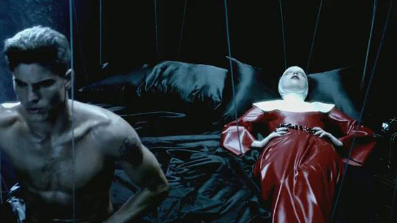It’s becoming more common to find churches that offer mass with sign language. But how often do you hear about the Sacrament of Reconciliation being offered for those who are hearing impaired?
Well, they offered it recently in Georgia. From the Georgia Bulletin:
Frania Franch-Sonner emerged from a makeshift confessional made of a steel frame covered in black velvet drapery in the Kenyan Suite of the Georgia International Convention Center assured that “now I know what to do.”
These words were interpreted by Chase Womack, 19, using American Sign Language. Both attended the Deaf Track of the 2010 Eucharistic Congress, where the deaf and hearing impaired found inspiration and had the opportunity to do something they only occasionally are able to do–experience the sacrament of reconciliation with a priest who knows sign language.
Participants listened and watched as presenter Father Michael Medas shared with them on the topics of being chosen by God and living in the peace and happiness of God. Nestled in between small group sharings and talks by Father Medas were two windows of time for the sacrament of reconciliation in ASL with the visiting priest.
Sharing critical sacramental moments with a signing priest is rare for many with hearing impairments, but awareness of the need of this group within the Church for spiritual counseling and direct communication with priests is growing nationally, said Father Medas. From the Boston Archdiocese, he has served the hearing impaired there as an interpreter and has served on a larger scale as a past member of the National Catholic Office for the Deaf board of directors. He currently resides and works at St. John’s Seminary as director of pastoral formation.
Franch-Sonner described her own faith journey, how it was impacted by her mother who was a “strong Catholic,” and the challenge of experiencing the sacraments.
“It was really hard for me,” she said through an interpreter. “My mother used visuals to help me understand (the faith).”
When she was young and preparing for the sacrament of reconciliation her mother suggested she write something down for the priest to read.
“I had my confession ready. The priest made suggestions and wrote those down as well. I was limited in my communication with him, though,” she said.
Not until she attended college for the hearing impaired did she see an interpreter. “It was then that I started to really understand the Catholic faith.”
Still, finding priests who know sign language has been challenging. She was 40 when she first experienced the sacrament of reconciliation with a signing priest present at a conference sponsored by the National Catholic Office for the Deaf.
Check out more at the Bulletin link.

